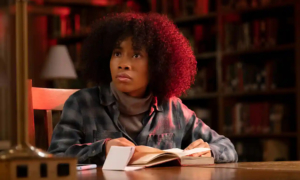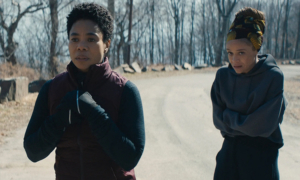“It came to me in an instant, after I ran into the master of my residential college a few years after graduating…”
We wouldn’t like to infer how that meeting went but we’re talking to writer and director Mariama Diallo about her upcoming horror Master, a story of three African American women and their disturbing experiences at a predominantly white college in New England named Ancaster.
However, what we do know is the inspiration for the story came from a personal place… “While I was writing the film, it’s just so personal to me and so specific to my experience that I was really just building out from my own life,” she continues. “From my observations and things that I found amusing or horrific or important to discuss.”
The three women in question are Gail (Regina Hall), an academic who has just received the revered promotion of Master at Ancaster, Gail’s fellow academic Liv (Amber Gray) and Jasmine, a gifted first-year student who may have been put in a haunted room at the college, played by Zoe Renee: “Jasmine is an absolutely genius student,” she tells us about her character. “She’s come from an amazing home, who has raised her to be genuinely the best she can be. She’s dreamed of going to college her entire life.
“We meet her on the first day of college and her expectations are unbelievably high. As she starts to live throughout this campus, she starts to notice that her role is a bit other than everyone else, and she’s trying to pinpoint why. I’m not sure she really gets a firm grasp on it until later in the film.
“So we see her go through the motions of trying to figure out, not only how to thrive academically, but also how to thrive socially, which she has never had a problem with it. So you’re watching someone genuinely try to fit in. We’ve all been in situations where we just want it to be an easy transition and as we see in this movie, it’s tough to watch when it doesn’t actually go the way she planned…”

Jasmine isn’t the only one dealing with things not going the way they planned. For Gail, though she’s reached the upper echelons of positions at the college, she’s still struggling to find respect from her colleagues and frequently instead faces prejudice. “Gail has spent essentially the entirety of her professional career at Ancaster, where she had also been an undergraduate. She is a hyper-motivated, very ambitious professional who’s just been promoted to this new position called Master, which in many ways represents the pinnacle of her professional hopes and dreams. But at the same time she’s trying to ward off the racism of her colleagues and the institution itself.”
Indeed, though Ancaster ‘prides itself on its diversity’, Jasmine, Gail and Liv all face instances of racism in varying ways. “I think that microaggressions would be one [of the movie’s themes],” Renee tells us. “Which is probably skimmed over a lot when we talk about predominantly white institutions. I don’t know if we’ve seen a lot of film, or even footage, of the things that could possibly be happening to students of colour. I think mental health would be another theme and then I think really, institutional racism would be another.”
Those instances result in Jasmine feeling isolated from her fellow classmates at school, a place where she usually thrives, and for Renee, those experiences were all-too recognisable: “I read the script and I saw my friends, I saw my people. I saw people that I know and I saw some of me as well. When I read any script that’s a really cool thing to find. It’s amazing to read something and be like ‘wow, okay, I know my friend just had that experience and she felt isolated in that moment’. It was just cool to see that and I think as we’re building more stories and more worlds and experiences on film, I think it’s really important to dive into those moments that feel really true and honest.”
As Gail, Liv and Jasmine’s abhorrent experiences turn more and more horrific, so too does Master and the themes of microaggressions, racism and mental health blend with the all-too-fitting genre of horror. “When I first started writing this film, I would call Master a ‘spooky drama’,” Diallo tells us. “It really felt like at its core it’s a dramatic story. It’s the story of these three women, it’s very character-based. It’s focused on them and their lives and examining their emotional experience at the school.
“But it’s also a horror film and it’s told through the lens of horror because I think that that dovetails perfectly with their emotional experiences. Horror feels, of all the genres, the most authentic expression of what the characters are going through and what the space of that school gives in terms of energy.”

Indeed, horror has always been unafraid to face the most vile of experiences head-on, so it was a fitting genre to portray Master’s themes: “I think that horror, when it’s working at its highest level, is always an expression of anxiety,” Diallo says. “I think that it’s a personal anxiety that can be extrapolated out societally, and I see that in horror films going back to Rosemary’s Baby. When I watch Rosemary’s Baby, part of what I think it’s discussing is a woman’s loss of autonomy over her body when she becomes pregnant, the expectations that others have on women and the lack of physical boundaries that women are able to enforce upon ourselves.
“When we see horror films now, with a film like Master where it’s a horror film and it’s also discussing the horror of being a woman of colour in a predominantly white institution, it’s a continuation of this theme in horror. I think that because of the emotional space that it allows viewers to enter, you’re just able to be open to a lot of different concepts and ideas.”
“I think there’s something about the urgency of horror that allows topics like these to be thrown on our audience,” Renee agrees. “I think there’s such an urgency in Master. It makes it extremely important. If this was a story that we told as a deep, heavy drama, I’m not sure the severity of the situation would have come across correctly.
“I love that Mariama was bold enough to dive that deep into it. I also think it validates, (it might not look), but how it feels when these microaggressions are happening. It’s an energy that you can’t necessarily explain and it is terrifying and it’s horrific really. It’s isolating and it feels cold. I think horror was really an amazing medium to jump into with this one.”
Like any decent horror, don’t expect Master to leave you at the end of it feeling quietly satisfied or to be neatly tied up in a bow. “Overall I’m very happy to leave viewers to come to their own conclusions,” Diallo says. “Which is some of what motivated the ending and the ambiguity and a little bit of the openness of the storytelling. I wanted to leave room for viewers’ interpretation and for viewers to take from it what they will. But there are so many different themes in the film that are interesting and important to me. I put them out there and I let people either take them or leave them.”
Renee also hopes that the movie promotes discussion, after they’ve got over their shock at the ending of course… “I hope they just take their time with the shock,” she says. “I hope they sit in that shock for a second. I hope they try to ask as many questions as possible to themselves, to their friends. I want them to dive into that conversation. I want us to talk about it. I want us to talk about this. I think that if that happens after this film and after people watch. I will be so happy.”
Master is out now on Prime Video.
